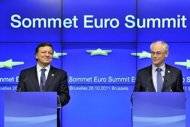Europe seals deal to contain debt crisis

After days of talks and two successive summits that dragged on for almost 10 hours as markets and world leaders remained on tenterhooks, EU president Herman Van Rompuy emerged in the wee hours saying: "We took important decisions."
Asian stock markets rallied and the euro rose on the announcement with Tokyo up 1.15 per cent and Hong Kong rising 1.74 per cent in midday trade. The euro was higher, buying $1.3958 up somewhat from $1.3908 late Wednesday in New York.
As Asia shares firmed, IMF chief Christine Lagarde welcomed "substantial progress", but European Central Bank chief Jean-Claude Trichet warned that "all of this now requires a lot of work and a lot of quick work."
The last and perhaps toughest chapter in the four-point plan was a deal between eurozone leaders and the Institute of International Finance banking lobby to force private investors to take a 50 per cent loss on Greece's debt.
French President Nicolas Sarkozy and German Chancellor Angela Merkel broke off from the summit to save the day and cut a deal with the head of the banking lobby, Charles Dallara.
"We said it was our last word, our last offer," said Merkel of threats to allow Greece to default failing agreement.
"We have done what needed doing," she said.
The banks in past weeks had raised their offer to 40 per cent but governments insisted on a 50-per cent "haircut".
The deal aims to slice a whopping 100 billion euros off the 350-billion-euro debt pile hampering Greece, which also won new pledges of a 100-billion-euro loan over the next three years.
Prime Minister George Papandreou, hailed "a new era, a new chapter" for Greece, whose debt woes kicked off a two-year crisis that successively hit Ireland and Portugal before threatening to spill over to the euro area's third and fourth economies, Italy and Spain.
To address that danger, eurozone leaders agreed to boost their debt rescue fund to one trillion euros.
The firepower of the European Financial Stability Facility (EFSF) is to be leveraged up between four- and five-fold using clever financial footwork to avoid governments increasing guarantees.
With the world on tenterhooks, emerging powers China and Russia waded in with offers to help Europe safeguard the global economy by contributing to the fund.
The development came as global powers, from the United States to Japan and China, pressed European leaders to come up with a lasting solution to the debt crisis before a G20 summit in France on November 3 and 4.
Europe's leaders agreed two options to boost the EFSF without increasing commitments from member states as taxpayers in countries such as Germany complain about pouring money down what they see as a bottomless hole.
The first option allows the EFSF to provide risk insurance on new debt issued by fragile governments, in a bid to convince investors to continue buying their bonds and keep interest rates low.
A second fund, linked to the EFSF, will be created to attract private and public investors, including countries outside the eurozone. This investment vehicle could also be associated with the International Monetary Fund, an idea Russia has said it prefers.
With fears growing that the debt drama will turn into a banking system meltdown, European leaders also struck a deal to force banks to recapitalise at a summit of the 27-nation EU that preceded the eurozone talks.
"We made good progress on the bank recapitalisation, that wasn't watered down, it now has been agreed," said British Prime Minister David Cameron.
The European Banking Authority said banks would need 106 billion euros to fulfill the requirements.
With fears of contagion hitting Italy, Prime Minister Silvio Berlusconi came to the summit with a detailed list of pledges to cut his country's 1.9-trillion-euro debt.
Van Rompuy said leaders welcomed the vows but called on Rome to "abide" by its commitments.
What the stars mean:
★ Poor ★ ★ Promising ★★★ Good ★★★★ Very good ★★★★★ Exceptional
Related Contents
Latest News
More News
- Russian President congratulates Vietnamese Party leader during phone talks (January 25, 2026 | 09:58)
- Worldwide congratulations underscore confidence in Vietnam’s 14th Party Congress (January 23, 2026 | 09:02)
- Political parties, organisations, int’l friends send congratulations to 14th National Party Congress (January 22, 2026 | 09:33)
- 14th National Party Congress: Japanese media highlight Vietnam’s growth targets (January 21, 2026 | 09:46)
- 14th National Party Congress: Driving force for Vietnam to continue renewal, innovation, breakthroughs (January 21, 2026 | 09:42)
- Vietnam remains spiritual support for progressive forces: Colombian party leader (January 21, 2026 | 08:00)
- Int'l media provides large coverage of 14th National Party Congress's first working day (January 20, 2026 | 09:09)
- Vietnamese firms win top honours at ASEAN Digital Awards (January 16, 2026 | 16:45)
- ASEAN Digital Ministers' Meeting opens in Hanoi (January 15, 2026 | 15:33)
- ASEAN economies move up the global chip value chain (December 09, 2025 | 13:32)

 Tag:
Tag:




















 Mobile Version
Mobile Version